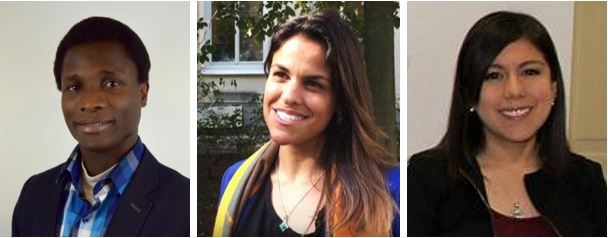
Three researchers from Peru, Brazil and Nigeria have joined the Mistra Geopolitics Research School. These next-generation scholars with diverse research expertise are spending four months with Swedish partner institutions SIPRI and Linköping University to complement the programme’s research with varied global perspectives.
Mistra Geopolitics programme is unique in that it includes a two-year research school with eight doctoral students. PhD students from around the world were invited to apply for scholarships to join as visiting researchers. The chosen scholars are being introduced to methods, theories, and data collection techniques for advanced analysis of geopolitics and sustainable development. The research school also acts as a meeting point for doctoral students, researchers and the Scientific Advisory Board.
The three students selected to join the programme are Ayodeji Anthony Aduloju, Ady Chinchay and Beatriz Rodrigues Bessa Mattos. Their research areas include food security, extractive governance, global governance, the geopolitics of environmental stressors and the role of indigenous people in environmental governance.
“The Mistra Geopolitics programme has and continues to refine my thinking on the conceptual and theoretical underpinnings of my study,” said Aduloju, a doctoral candidate at the Obafemi Awolowo University’s Department of International Relations in Ile-Ife, Nigeria. He is optimistic that the programme will improve his analytical ability to develop a well-thought final analysis of his study. “The research school has so far exceeded my expectations,” he added enthusiastically.
His research relates to the post-amnesty Niger Delta and maritime security in the Gulf of Guinea. His study interrogates the amnesty programme by the Nigerian government in its oil-rich Niger Delta region, which should be a framework for intervention on incessant environmental-induced conflict, injustice, underdevelopment and insecurity. Aduloju’s research focus is centred on peace, conflict, gender, development, security and regionalism with a special emphasis on Africa.
He is positive about the opportunity to learn from his fellow doctoral students, researchers and the Scientific Advisory Board.
Ady Chinchay joins the research school from the Pontifical Catholic University of Peru where she is a doctoral candidate in the Department of Sociology. She is a lawyer who holds two master’s degrees in International Public Policy and Comparative Law from the University of Bath and the International University College of Turin, respectively. She is especially interested in researching the diffusion and implementation of environmental policies related to territorial ordering and other environmental institutions.
She is part of work package three of Mistra Geopolitics, focused on governance responses to environmental related security risk. Chinchay explains that the opportunity to be a visiting researcher in the programme is important for scholars to expand their network and exchange valuable insights in their fields of study.
“The programme is a huge step in my academic trajectory because this is a unique platform to discuss my PhD research about the role of extractive industries and international cooperation agencies in the implementation of environmental institutions,” Chinchay said. She is eager to get in touch with scholars with expertise in her field to share fieldwork findings and proposals; receive invaluable feedback; and expand her theoretical and interdisciplinary knowledge.
Beatriz Rodrigues Bessa Mattos is a doctoral student from the Pontifical Catholic University’s Institute of International Relations in Rio de Janeiro, Brazil. She is interested in the links between climate change and security, with specific focus on ontological security in Pacific Island states. She explains that the Mistra Geopolitics research programme is in line with her work and she has high expectations for possibilities within the research school.
“I believe being here in Sweden is an excellent opportunity to move forward in this research because of the Swedish security agenda that is deeply connected to environmental issues,” she added.
Head of the research school, Maria-Therese Gustafsson – a research fellow at the Department of Political Science in Stockholm University – is optimistic of the value the visiting researchers will add. She says that learning about their research has been an important source of inspiration as they have brought in new perspectives and contributed with well-anchored empirical research on issues at the core of the Mistra Geopolitics programme.
Maria-Therese hopes that there will be more opportunities to maintain and strengthen ties with scholars from the global south within the framework of the research school.



